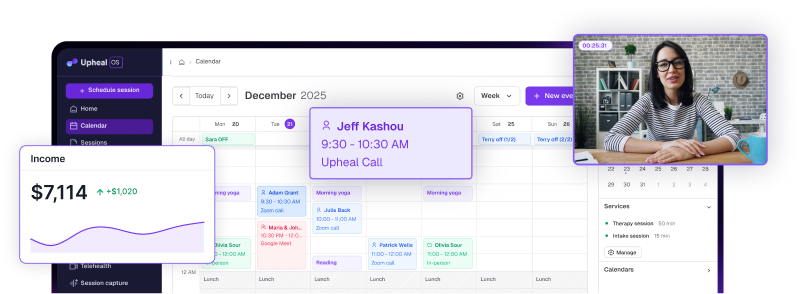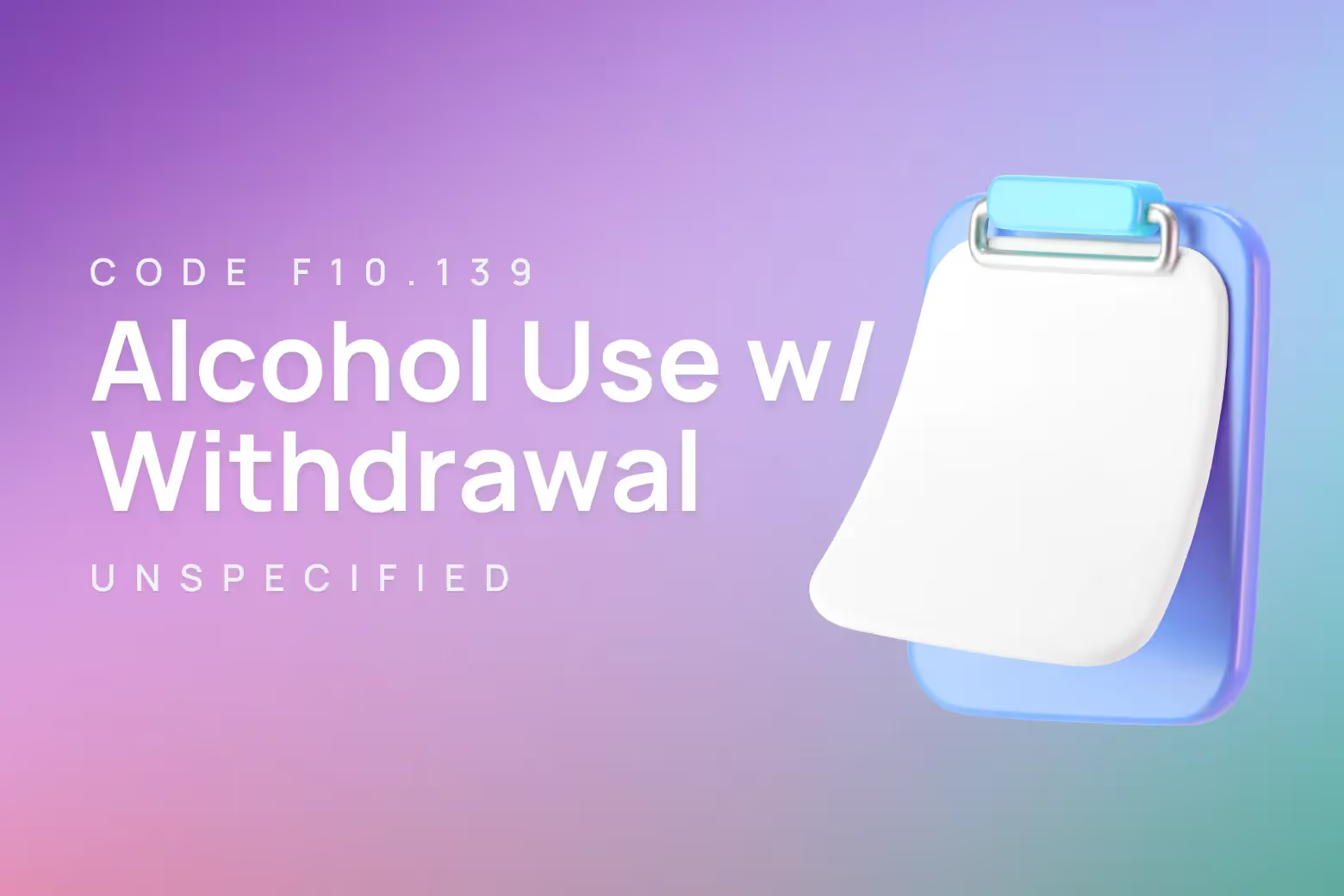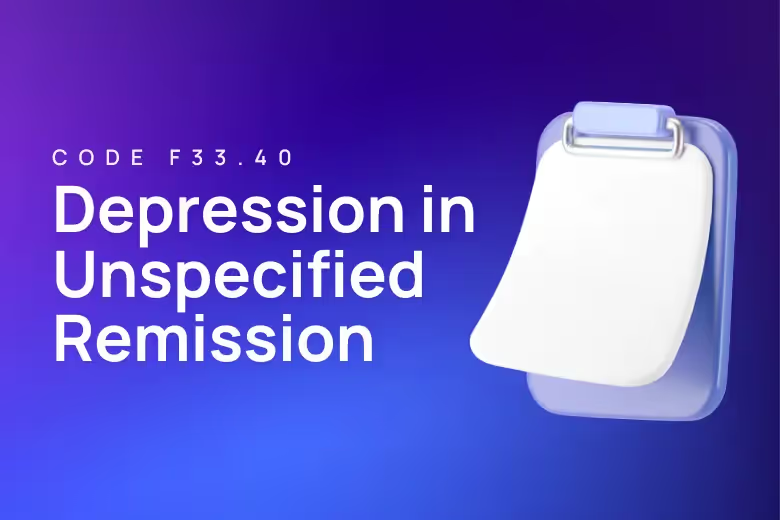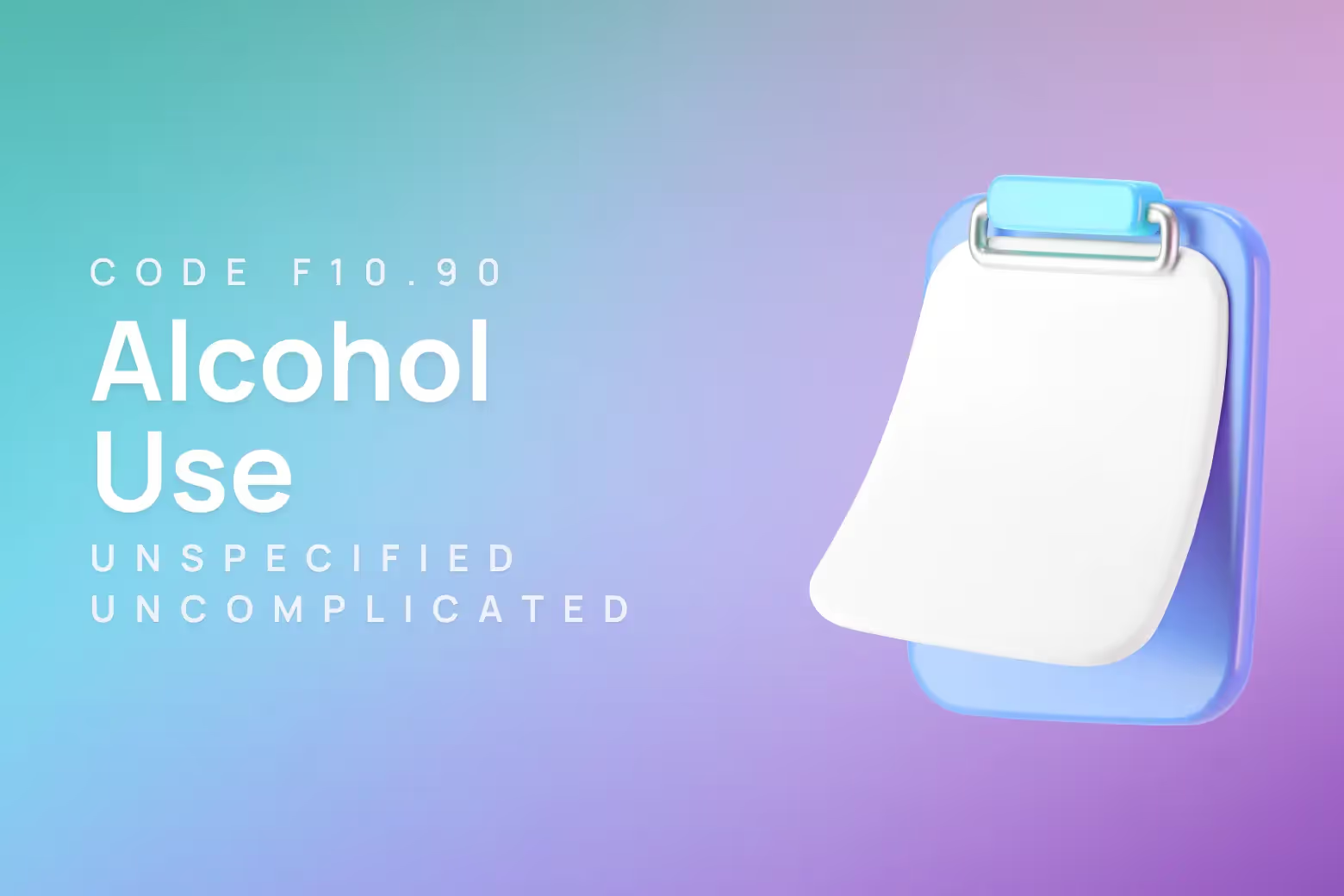ICD-10 code for alcohol dependence, uncomplicated

F10.20 is the ICD-10 code for alcohol dependence, uncomplicated.
This code identifies individuals who meet criteria for alcohol dependence syndrome without current physiological complications such as withdrawal symptoms or alcohol-induced medical conditions.
Accurate diagnosis and proper coding ensure appropriate treatment planning and reimbursement for clinicians supporting clients through recovery.
Key features:
- Requires a problematic pattern of alcohol use causing significant impairment or distress with at least two diagnostic criteria
- Distinguished from alcohol abuse by the presence of dependence features including tolerance, withdrawal potential, or compulsive use patterns
- Does not include active withdrawal, intoxication, or alcohol-induced mental disorders requiring separate coding
- Treatment typically combines psychotherapy approaches with potential medication-assisted treatment and community support resources

Diagnostic criteria for alcohol dependence, uncomplicated (F10.20)
Alcohol dependence represents a chronic condition characterized by physical and psychological reliance on alcohol. The diagnosis requires careful assessment of drinking patterns, consequences, and the individual's relationship with alcohol over time.
Clinicians should evaluate whether the client demonstrates a persistent pattern of alcohol use despite harmful consequences. This pattern must cause significant distress or functional impairment in social, occupational, or other important life areas.
The diagnosis requires at least two of the following criteria occurring within a 12-month period:
- Consuming alcohol in larger amounts or over longer periods than intended
- Persistent desire or unsuccessful efforts to reduce or control alcohol use
- Spending considerable time obtaining alcohol, drinking, or recovering from its effects
- Strong cravings or urges to use alcohol
- Recurrent alcohol use resulting in failure to fulfill major obligations at work, school, or home
- Continued alcohol use despite persistent social or interpersonal problems caused or worsened by drinking
- Giving up or reducing important social, occupational, or recreational activities because of alcohol use
- Recurrent alcohol use in physically hazardous situations
- Continued use despite knowledge of persistent physical or psychological problems likely caused or exacerbated by alcohol
- Tolerance, defined by needing increased amounts to achieve desired effect or diminished effect with continued use of the same amount
- Withdrawal symptoms when alcohol use is reduced or stopped, or drinking to relieve or avoid withdrawal
The "uncomplicated" specifier indicates the absence of withdrawal symptoms, intoxication, or alcohol-induced disorders at the time of diagnosis.
When to use F10.20 diagnosis code
Differential diagnosis ensures clinicians select the most accurate code reflecting the client's current presentation. Understanding distinctions between related alcohol use disorder codes prevents documentation errors and supports appropriate treatment authorization.
F10.20 vs F10.10 (Alcohol abuse, uncomplicated)
Alcohol abuse involves harmful drinking patterns without the dependence features seen in F10.20. Clients with F10.10 experience negative consequences from drinking but haven't developed tolerance, withdrawal potential, or the compulsive use patterns characteristic of dependence.
F10.20 requires at least two dependence criteria within 12 months, while F10.10 may involve fewer criteria focused primarily on consequences rather than physiological dependence. The distinction affects treatment intensity and insurance authorization for higher levels of care.
F10.20 vs F10.21 (Alcohol dependence, in remission)
F10.21 applies when a client previously met criteria for alcohol dependence but currently shows no active symptoms beyond occasional cravings. Early remission spans 3-12 months of abstinence or controlled use, while sustained remission extends beyond 12 months.
Clinicians use F10.20 for active dependence requiring ongoing intervention. The remission code recognizes recovery progress while maintaining the diagnosis for continued treatment and relapse prevention work.
F10.20 vs F10.23 (Alcohol dependence with withdrawal)
F10.23 captures acute withdrawal symptoms occurring when alcohol use suddenly decreases or stops. Physical symptoms may include tremors, sweating, elevated heart rate, anxiety, nausea, or in severe cases, seizures or delirium tremens.
F10.20 excludes active withdrawal presentations. When clients present with withdrawal symptoms, clinicians must code F10.23 instead, as this distinction triggers different treatment protocols and potentially higher reimbursement for medical monitoring.
Related ICD-10 codes
- F10.10 - Alcohol abuse, uncomplicated
- F10.11 - Alcohol abuse, in remission
- F10.21 - Alcohol dependence, in remission
- F10.23 - Alcohol dependence with withdrawal
- F10.24 - Alcohol dependence with alcohol-induced mood disorder
- F10.25 - Alcohol dependence with alcohol-induced psychotic disorder
- F10.26 - Alcohol dependence with alcohol-induced persisting amnestic disorder
- F10.27 - Alcohol dependence with alcohol-induced persisting dementia
Interventions and CPT codes for alcohol dependence
Evidence-based treatment for alcohol dependence combines therapeutic approaches addressing both the physical and psychological components of addiction. Clinicians select interventions based on severity, client motivation, and available resources.
Initial psychiatric diagnostic evaluation (90791)
The comprehensive intake establishes the diagnosis and treatment plan. Clinicians gather detailed drinking history, assess mental status, evaluate medical complications, and identify co-occurring mental health conditions. This session typically lasts 60-90 minutes and provides the foundation for all subsequent treatment.
Documentation should include alcohol use patterns, quantity and frequency, previous quit attempts, withdrawal history, and functional impairment across life domains. The evaluation informs decisions about appropriate level of care and medication-assisted treatment needs.
Individual psychotherapy (90832, 90834, 90837)
Individual therapy sessions form the core of outpatient treatment. Motivational interviewing helps resolve ambivalence about change, while cognitive-behavioral approaches target drinking triggers and develop coping skills. Relapse prevention strategies identify high-risk situations and build alternative responses.
Session length determines the appropriate code: 90832 for 16-37 minutes, 90834 for 38-52 minutes, or 90837 for 53 minutes or longer. Regular individual sessions support sustained behavior change and address underlying issues contributing to alcohol dependence.
Family psychotherapy (90846, 90847)
Family involvement strengthens recovery outcomes by addressing relationship patterns that may enable drinking or create barriers to sobriety. Sessions help family members understand addiction, set appropriate boundaries, and develop supportive communication patterns.
Code 90846 applies when the client is not present, while 90847 includes the client in family sessions. These interventions prove particularly valuable when codependency or family conflict contributes to drinking patterns.
Group psychotherapy (90853)
Group therapy provides peer support and skills training in a cost-effective format. Clients learn from others' experiences, practice interpersonal skills, and build a recovery community. Groups may focus on relapse prevention, coping skills, or maintaining sobriety through mutual support.
Many treatment programs combine individual and group modalities, using group sessions for skills development and peer support while reserving individual time for personalized treatment planning and crisis intervention.
Screening and brief intervention (99408, 99409, G0396, G0397)
Brief intervention codes apply when visits focus primarily on screening and counseling rather than ongoing psychotherapy. Commercial payers typically accept 99408 for 15-30 minutes or 99409 for longer sessions. Medicare uses G0396 and G0397 for similar timeframes.
These codes work well for clients not yet ready for formal treatment. Brief interventions use motivational techniques to increase awareness of drinking consequences and encourage behavior change. Documentation must include the screening tool used, score, risk level, and specific brief intervention elements provided.
Medicare preventive services (G0442, G0443)
Medicare covers annual alcohol screening (G0442) for 5-15 minutes and up to four brief counseling sessions (G0443) per year following a positive screen. Each counseling session lasts approximately 15 minutes and focuses on alcohol misuse reduction strategies.
While typically billed in primary care settings, some Medicare contractors allow behavioral health clinicians to use these codes. Clinicians should verify local coverage policies before implementing preventive screening protocols. (Medicare Coverage Guidelines)
Medicaid SBIRT services (H0049, H0050)
Many Medicaid programs require H-codes for substance use screening and brief intervention. H0049 covers alcohol and drug screening using standardized instruments like the AUDIT or CAGE questionnaire. H0050 bills brief intervention in 15-minute increments.
State Medicaid policies vary significantly regarding H-code usage and which providers may bill these services. Clinicians should consult their state's Medicaid manual for specific documentation and billing requirements. (State Medicaid Guidelines)
Behavioral health assessment (96127)
Some payers reimburse separately for each standardized screening instrument administered and scored. Code 96127 applies to brief assessment tools like the AUDIT-C or DAST-10 when documented as part of treatment monitoring or initial evaluation.
Billing policies differ on whether 96127 may be submitted on the same date as psychotherapy services. Many payers consider screening integral to the therapy session and bundle reimbursement, while others allow separate payment for distinct assessment activities.
How Upheal improves F10.20 ICD-10 documentation
Clinical documentation platforms designed for behavioral health practice help clinicians manage the complex requirements of substance use disorder treatment. These tools reduce administrative burden while improving documentation accuracy and compliance.
Suggesting appropriate ICD-10 codes based on session content
Documentation software analyzes session content to recommend relevant diagnosis codes. For alcohol dependence cases, the platform recognizes clinical language related to tolerance, withdrawal potential, failed quit attempts, and drinking-related consequences.
Clinicians review suggested codes and confirm the most accurate option. This approach reduces coding errors while ensuring documentation supports the selected diagnosis. The system flags when session notes describe symptoms beyond uncomplicated dependence that might warrant codes for withdrawal, mood disorders, or other complications.
Maintaining HIPAA-compliant records with proper diagnostic coding
Secure platforms protect sensitive substance use information while organizing documentation for easy retrieval. Automated coding suggestions ensure each session connects to the appropriate diagnosis and treatment plan, creating a cohesive clinical record.
Proper diagnostic coding matters for both insurance reimbursement and clinical care coordination. When documentation clearly links presenting problems, interventions, and diagnoses, treatment teams can better track progress and adjust approaches as needed. Compliance features prevent common errors that trigger claim denials or audit findings.
Reducing administrative burden so you can focus on client care
Time spent on documentation takes away from direct client contact and clinical planning. Platforms that simplify coding selection, generate compliant progress notes, and organize treatment plans allow clinicians to spend more time on therapeutic activities.
For alcohol dependence treatment requiring frequent monitoring and multiple intervention types, streamlined documentation becomes especially valuable. Clinicians can quickly document group sessions, individual therapy, and family interventions while maintaining clear records of progress toward treatment goals.
Supporting clients with alcohol dependence
Recovery from alcohol dependence requires sustained effort, supportive relationships, and often multiple treatment episodes. Clinicians provide crucial support by validating struggles, celebrating progress, and helping clients navigate setbacks without losing hope.
Treatment works best when tailored to individual needs and preferences. Some clients thrive with abstinence-focused approaches, while others benefit from harm reduction strategies that gradually decrease alcohol consumption. Meeting clients where they are increases engagement and improves outcomes.
The journey through alcohol dependence treatment involves building new coping strategies, repairing relationships, and developing a life worth living without alcohol. Clinicians who combine evidence-based interventions with genuine therapeutic presence create the conditions for lasting change.
Upheal's clinical documentation platform supports this important work by handling administrative tasks efficiently. Clinicians can focus on building therapeutic relationships and delivering effective interventions while the platform manages coding accuracy and compliance requirements.












